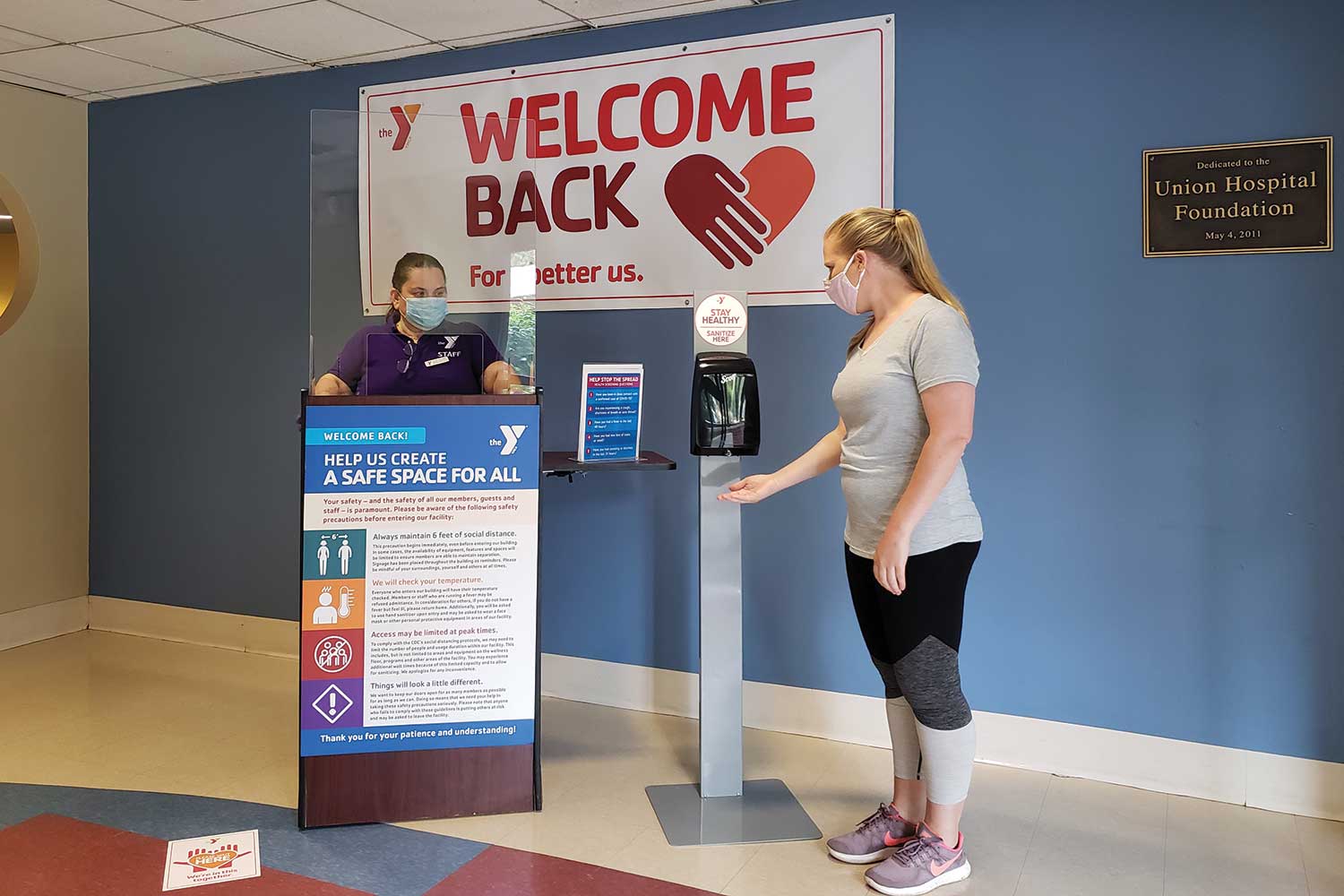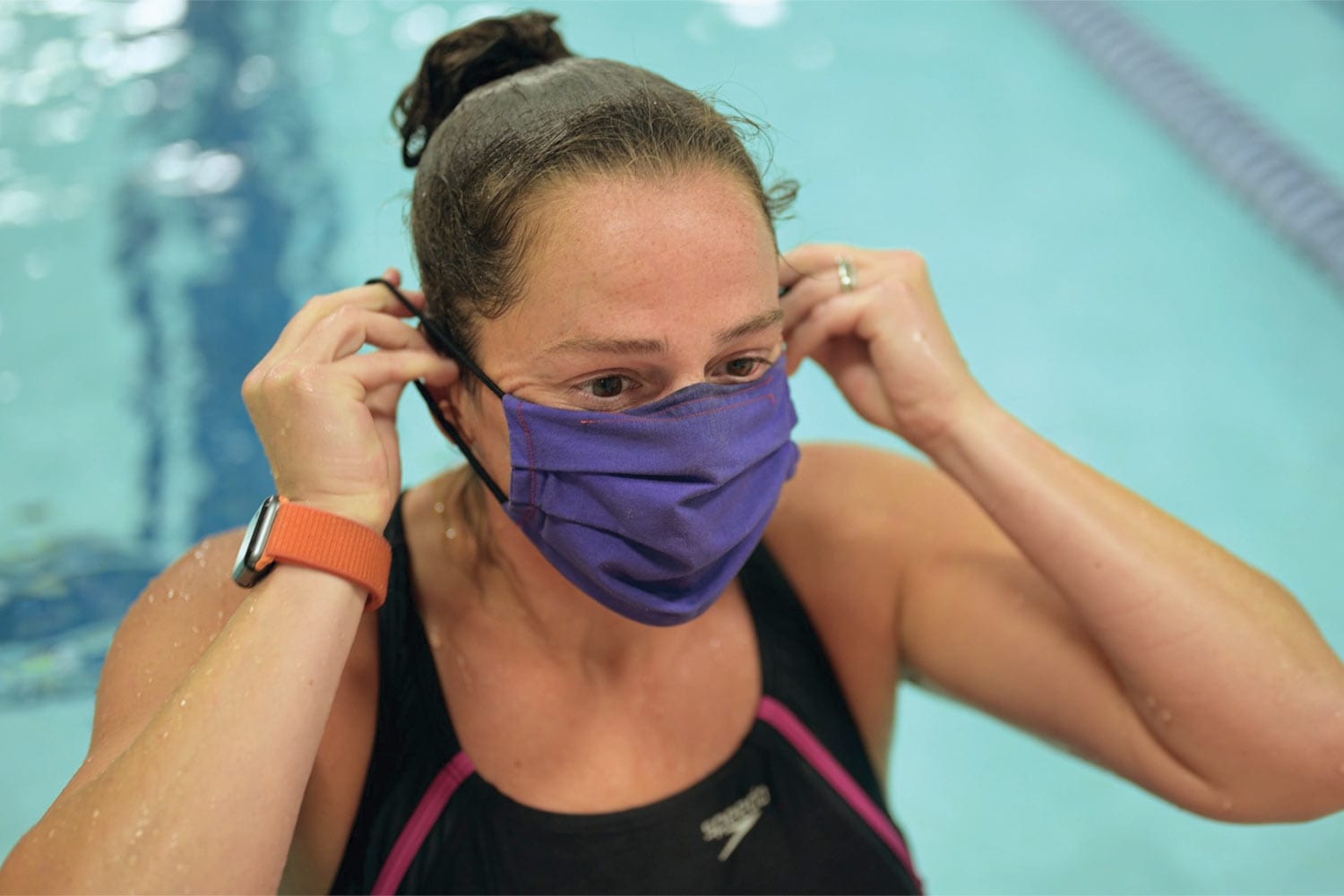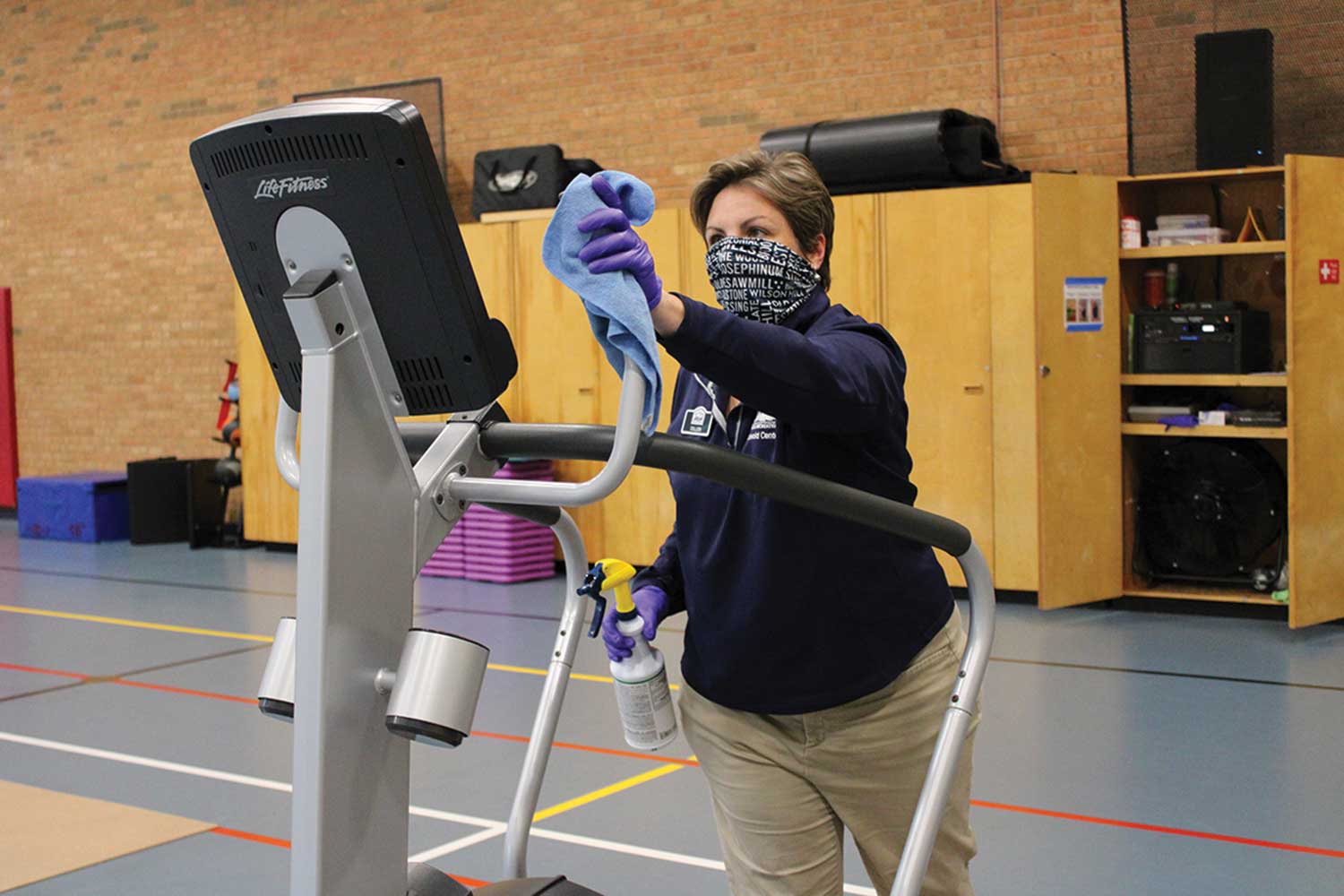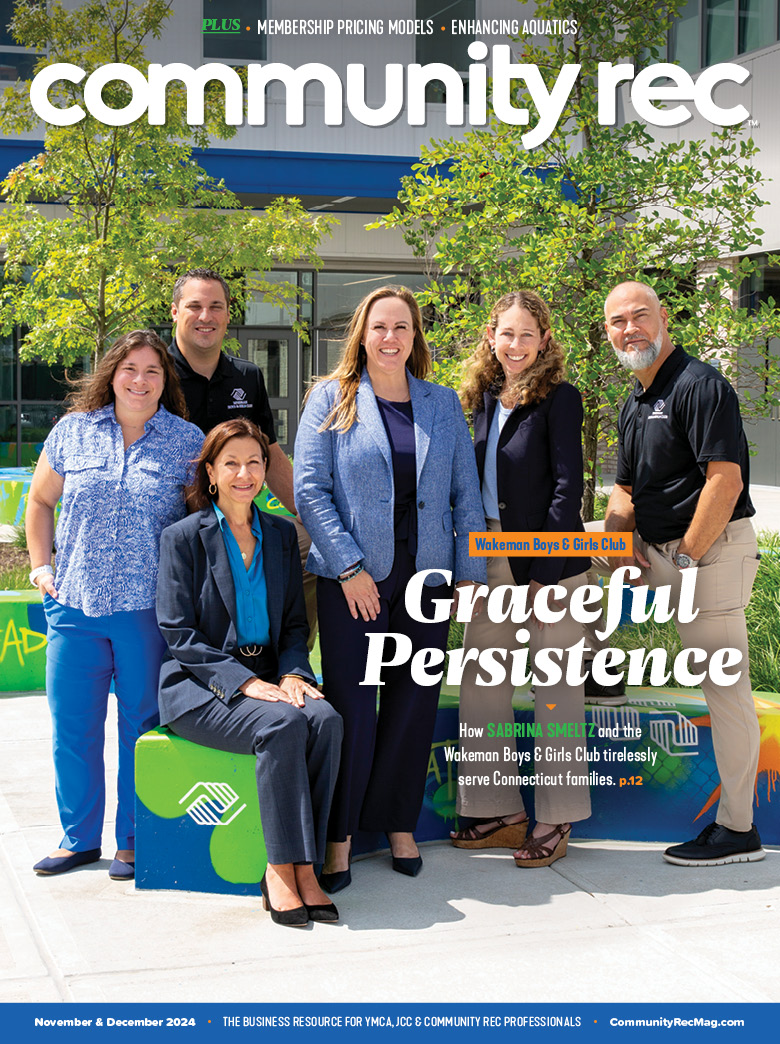How community rec centers are overcoming COVID-19 to serve their communities and navigate this unprecedented time.
“It is often in the darkest skies that we see the brightest stars.”
This quote by Richard Evans speaks volumes for the current state of the community rec industry. Throughout 2020, YMCAs, JCCs and community rec centers have been faced with a multitude of challenges, from laying off thousands of employees to enduring months of shutdowns — all while trying to help navigate tensions that have arisen due to social injustice and political unrest in America. While 2020 has had its dark moments, it has also proved rec centers are bright lights, and they show up when needed.
From delivering food to at-risk members, serving as childcare centers for children of essential employees and giving members an outlet to relieve COVID-19 stress through virtual programs, community rec centers didn’t fold when things got hard — they rose to the occasion.
Community recreation facilities exist to serve others, and while the challenges and impacts of the pandemic are far from over, they’ve helped reveal the need for what this industry does. In this story, seven industry leaders share their COVID-19 experiences, and how the industry can come out on top and continue to meet the needs of those they serve.
Chris Tointon, president & CEO, YMCA of Greater Omaha in Omaha, Nebraska
How has covid-19 impacted your organization? Our entire system changed for the better. Typically our facilities are highly utilized every day by members, with limited opportunities to make updates, extensively clean and make front-facing repairs without impeding on those members’ needs. COVID-19 closures and reduced usage allowed us to solve certain challenges that were previously difficult to address. On the other hand, not knowing how long we would need to shut down made certain decisions difficult.
How have you supported your staff during these difficult times? When the pandemic hit, we used a comprehensive communication strategy to make sure we could reach our 1,600 employees. This tiered approach helped us communicate strategies, talking points and decisions, and make them feel more connected. When we had to furlough employees, we made sure they were accessing unemployment resources, continued to pay benefits like health insurance and made sure they had an ongoing connection to the Y.
What advice can you give on staying positive? Most of us got into the business because we loved what we could do to strengthen the life of another person. None of that changes, regardless of how far you are away from the person. My advice would be to go back to that core reason for being in the industry and figure out how to continue to do that in today’s world.
Krystal Canady, CEO, Gateway Family YMCA in Union, New Jersey
How have you supported your staff during these difficult times? Because we provide housing and social services for 350 individuals, families and veterans each evening, our YMCA never closed. We have been open 24 hours a day, serving our local community.
Due to the current fiscal climate, our active staff team has significantly decreased and very difficult decisions had to be made operationally. Our human resources team has worked to support our staff team by providing resources and communicating throughout the pandemic and as we continue to bring back staff as roles and programs reopen.
What do you see the industry looking like moving forward? There will be lessons we learned during the pandemic that will continue. Our ability to offer programs virtually is one thing we plan to continue and expand upon. We need to ensure our members can access their favorite classes wherever they are. We know many of our older members live alone and wanted to ensure although they were social distancing, they had the ability to remain social within our programs.
What advice can you give on staying positive? Flexibility is key to surviving in the current environment. Our ability to pivot and begin offering virtual programs the day our branches closed was key to continuing to provide the support our members and community needed.

Todd Rockoff, president & CEO, Tucson JCC in Tucson, Arizona
How has COVID-19 impacted your organization? Our core competency is building community through bringing people together. We’ve needed to pivot to how we can still accomplish that in a way that’s not focused on being together in a physical sense, but in an emotional and spiritual way. That’s one of the good things — it has pushed us to be creative, to develop new and innovative ways of reaching people.
How have you supported your staff during these difficult times? We’ve arranged with Jewish Family and Children’s Services to create a direct line for a conversation. If someone needs to speak to a Master’s level therapist, they can do that at both no cost and no intake. There is an easy path for someone to get some guidance. I think being present, honest and clear with people really does help manage what could feel like a lot of unknown and stress.
What do you see the industry looking like moving forward? We’re still an essential service. I think people, theoretically, should spend a third of their life sleeping, a third of their life working and a third of their life recreating. So the idea that recreation facilities and programs will become obsolete is wrong. I think they may look different, they may take place at different times, but I think the idea of having a place you can go to see your friends and be part of a community is going to be essential.
What advice can you give on staying positive? You can’t ignore the fact there are challenges. You have to acknowledge that’s what we’re living in, but then try to find the moments of meaning. Is it hard? Of course it is. But we’re going to get through it, and we’re going to get through it together.
Dave Brown, president & CEO, Capital District YMCA in Albany, New York
How has COVID-19 impacted your facility? It’s given us an opportunity to go into our facilities and hit the reset button on some things we could do a little better operationally. Not having members there has given us the space and time to do those things.
From a negative standpoint, we’ve really been hit hard. We had to lay off 1,500 people, and we are only able to serve 33% capacity as that is what’s allowed in the building. We are only seeing about 25% participation from what our normal numbers were pre-COVID. I think the requirement of wearing a mask — which we understand is 100% for safety — is a dealbreaker for folks. Some people are just not comfortable wearing a mask while doing an intense workout. I don’t want to sound like we’re opposed to the mask, because we’re not, but it does come with a consequence.
What do you see the industry looking like moving forward? There are going to be peaks and valleys. Even when there is a vaccine, I think people are still going to have some apprehension about coming back. But I do think eventually, as we come up with solutions for COVID-19, people will return to fitness spaces.
Social interaction is something people look forward to — something that will always remain, even if it’s primarily virtual. As human beings, we were designed to interact with one another and be social, so that social aspect will bring people back inside.
What advice can you give on staying positive? As leaders we’re faced with the unenviable job of also dealing with the reality of the situation. So, that balance of facing reality and making very difficult decisions, as well as keeping spirits high, is really tough. The advice I’d give people is to be authentic and honest with folks. Be available to listen.

Carrie Ohorodnyk, executive director, Rose E. Schneider Family YMCA in Cranberry Township, Pennsylvania
How has COVID-19 impacted your organization? Revenue has been impacted drastically. Our membership is about 30% down and programs are about 60% down. We did, however, make the decision to continue drafting membership dues, rather than stopping them and then trying to get them back again — and we made sure to communicate this often to members. That helped us stay at about 70% of our budget.
I actually lost two directors once we reopened because they got a taste of what it was like to be at home with their families. Being in this industry, with the workload and the hours, it’s not a 40-hour-a-week job.
And finally, COVID-19 forced us into a complete discomfort zone and really challenged us. In the end, it also brought the team together. I love that they’ve been challenged, and they impress me every day with the ideas they have about how we need to run.
How have you supported your staff during these difficult times? We paid everybody through the whole closure. Our association is pretty adamant on trying to take care of our people, so when necessary, we have offered hours to people in different roles within the department, which means technically we thankfully haven’t had to furlough anyone. I guess you call it repurposing staff within departments.
What advice can you give on staying positive? I’ve used two words — reasonable and responsible. I’ve tried to make my decisions based on those two words. I tell my team we’ve got to love up on the people in our building right now, and we can’t continue to have the mentality that everything is shut down. You’ve got to look at what you can run and run it, and see what happens.
Darren Hurley, parks and recreation director, Worthington Parks and Recreation in Worthington, Ohio
How has COVID-19 impacted your organization? Having to cancel programs during spring and summer, along with furloughing part-time employees, has been extremely difficult. On the positive side, we never get downtime in our field, so having a chance to step back from facility and program operations, and do some assessment and planning, has been nice.
We’ve also had it reinforced how important parks and recreation is through the heavy usage of our parks throughout the pandemic, and through people indicating how much they miss the services we haven’t been able to provide.
What do you see the industry looking like moving forward? I believe some things will evolve as a result of this. We will likely sustain virtual programming as it has been very popular and has benefits beyond quarantine. Some of the heightened cleaning and sanitizing standards are likely to stay, since people will have adjusted expectations. Facilities may see a shift in how people want to engage — over time, we will have to learn our users’ attitudes and preferences.
What advice can you give on staying positive? The pandemic certainly has brought challenges, and some of them will be long-lasting, such as economic impacts. However, in a time where almost all commercial recreation options went away or were limited, I believe our services and their importance were only highlighted. Parks have never been busier, and people better understand the challenges of isolation and importance of social connectivity and interaction. If we are upbeat and do a good job of telling our stories, this can become a positive.

Steve Tarver, president & CEO, YMCA of Greater Louisville in Louisville, Kentucky
How has COVID-19 impacted your organization? The pandemic has caused a lot of stress, isolation, an increase in family dysfunction — especially where it already existed — and an increase in child abuse and neglect.
On a positive note, however, I’ve seen countless instances where people have come together and supported one another. Many people are being drawn closer to their faith. Also, the uncertainty of the future has caused our organization to focus on our core mission, and what that means to our culture and behavior.
How have you supported your staff during these difficult times? We’ve supported our staff in a few ways: extending benefits where possible, providing financial assistance through our Employee Assistance Fund and assisting staff with unemployment enrollments and job searches where needed.
What do you see the industry looking like moving forward? I believe it will be a very slow return to normal in regard to daily traffic in facilities, and a return to pre-COVID revenue and staffing levels. We’ll be maintaining these same safety protocols for months — maybe years — and promoting opportunities for social connectedness while maintaining physical distancing.
I also see the industry focusing more on supporting education and academic achievement, giving more attention to serving vulnerable populations and promoting equity and social justice — internally and externally.
What advice can you give on staying positive? In the Bible, Hebrews 11:1 says, “Faith is the evidence of things not seen.” We are in uncertain times and we cannot see where we are headed. Focus on your organizational mission, pray for others and maintain hope.










